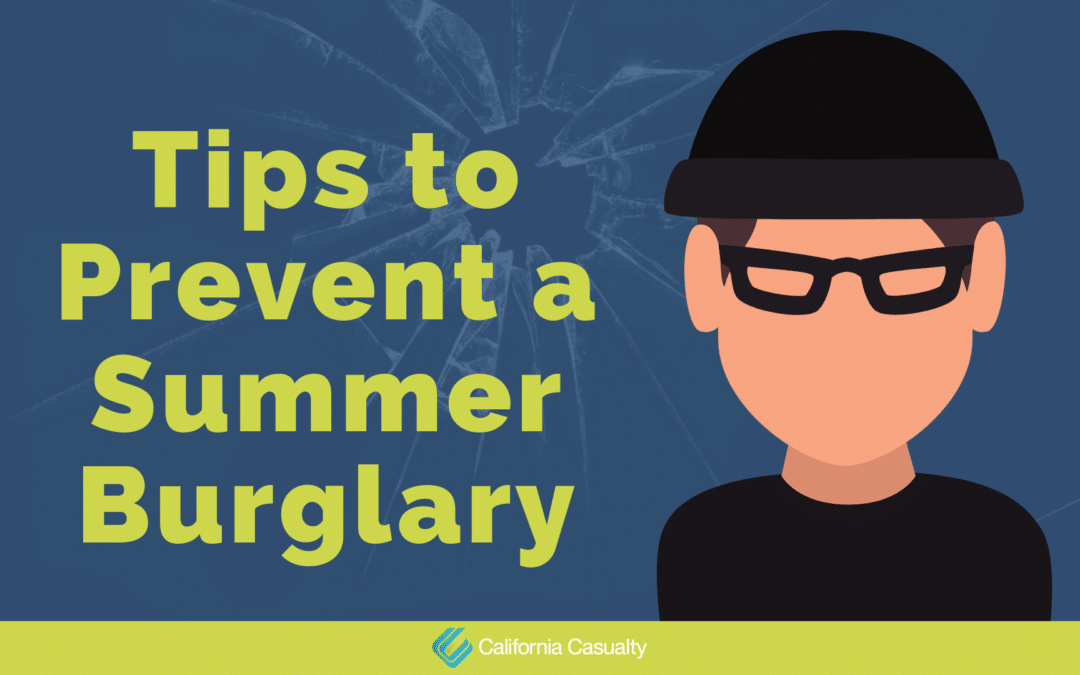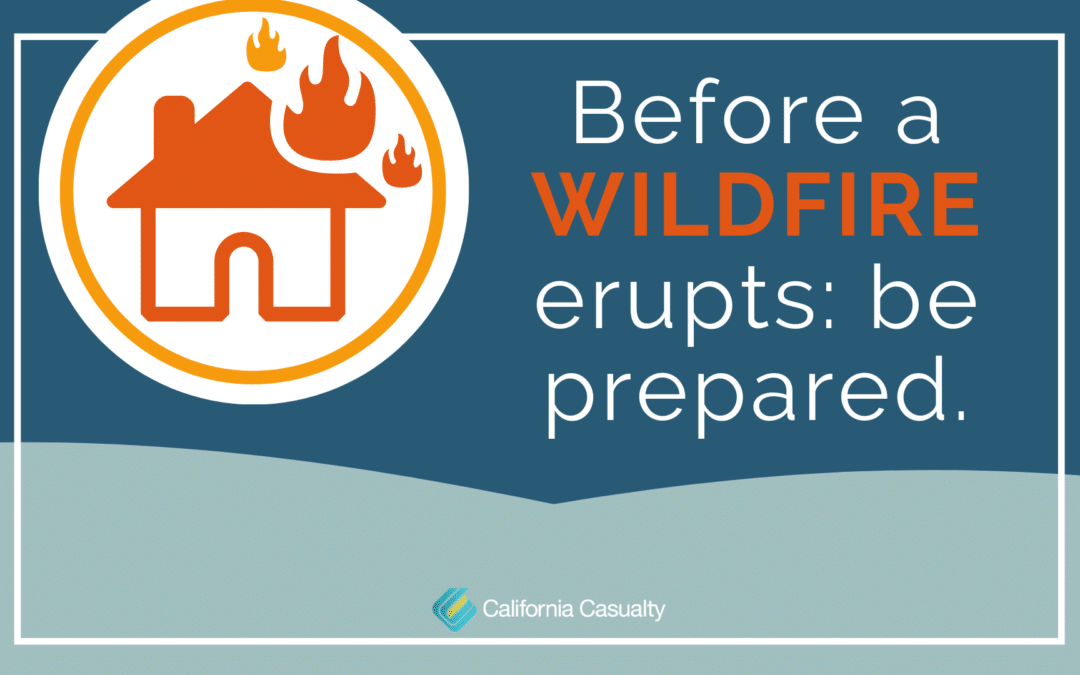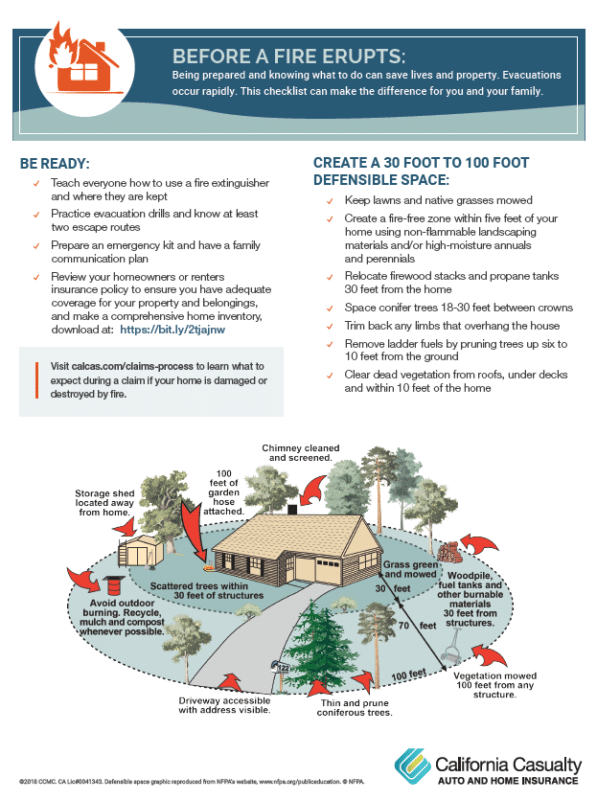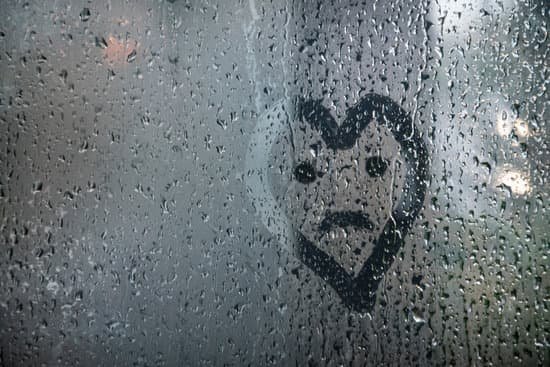
by California Casualty | Homeowners Insurance Info, Safety |
Summertime is in full swing! However, along with summer heat is the threat of summer burglary. Nobody wants to return home to find someone has burglarized their hard-earned possessions.
Unfortunately, the U.S. Department of Justice warns that break-ins heat up during the summer months. Most of those are crimes of opportunity from criminals looking for an easy target like open windows or garage doors.
Here are some tips to prevent a summer burglary:
Make Your Home Less Vulnerable
- Trim back bushes or hedges that block visibility and give a thief areas to hide
- Install outdoor lighting
- Put indoor lights on timers
- Have a security system installed
- Get a dog
- Keep garage doors closed
- Always lock doors and windows
- Keep watch of your neighbors’ homes and ask they do the same for you
- Have a trusted friend, neighbor or relative make trips to your home or park a car in the driveway to make it look lived in while you are away
Don’t Advertise to Criminals
- Stop mail and newspaper deliveries if you are going away
- Arrange for any home deliveries to your neighbors when you are not home
- Don’t leave garbage cans out while you are away
- Never leave notes on doors telling someone you are out and when you will return
- Leave a radio or TV on while you are away
- Conceal valuables and don’t them visible from the outside
- Break down and conceal boxes for expensive items and electronics when putting out the trash (boxes for the new 60” HD TV or the latest computer are like shopping flyers for thieves)
- Don’t advertise on social media that you are going away to grandma’s house or a wonderful vacation (this goes for your children)
Protect Yourself
- Make a complete home inventory of your possessions to assist if you need to file a police report, speed up an insurance claim and help with a tax-loss write off
- Be sure to have an identity theft protection and recovery service if burglars get access to your personal or banking information
- Protect your possessions with homeowners or renters insurance
Not only do you feel violated after someone breaks into your home, but it can be expensive to fix the damage and replace items. That’s why you need homeowners and renters insurance. We can’t stop all criminals, but California Casualty is here to protect you with quality auto and home insurance with exclusive benefits not available to the general public. Every policy also comes with free ID theft protection. Call an adviser today for a policy comparison or review at 1.800.800.9410, or visit www.calcas.com.
For more information visit:
https://bit.ly/2JXf93n
https://bit.ly/2YlWhDe
This article is furnished by California Casualty, providing auto and home insurance to teachers, law enforcement officers, firefighters and nurses. Get a quote at 1.866.704.8614 or www.calcas.com.

by California Casualty | Homeowners Insurance Info, Safety |
Wildfires seem to be burning faster and more intense than ever. The past few years have seen the largest and most destructive conflagrations in US history. Wildfire preparation tips are more important than ever.
Too many people have come back to find melted remnants of prized personal possessions; homes in ashes.
Here are five key wildfire preparation tips for your community or neighborhood:
- Create a home inventory. 60% of homeowners and renters have still not documented the things they own, which can cause post-fire/disaster headaches.
- Know where fire extinguishers are kept and teach everyone how to use them. Make them easily accessible in the event an of emergency.
- Have a family escape plan. Practice how you would exit your home from different rooms in the event of a fire and set a safe meeting point, away from the property, if you were to get separated.
- Prepare an emergency kit with important documents. Include copies of banking information, insurance policies, home mortgage and deeds, etc.
- Review and understand your insurance policy. Whether you are renting or owning, know what it pays and does not pay for. Get extra protection for collectibles and high-dollar possessions with a scheduled personal property endorsement.
While these are great wildfire preparation tips, there are several other things to keep in mind in you are effected :
- Contact your insurance company as soon as possible
- Secure the property from further damage
- Contact creditors, banks and appropriate agencies about credit cards, tax returns, Social Security cards or other papers that may have been scattered in the disaster
- Check your credit report to make sure nobody is using your personal information
- Be very wary of fly-by-night work crews and contractor fraud
Download and print your copy of these Wildfire Preparation Tips here.

This article is furnished by California Casualty, providing auto and home insurance to educators, law enforcement officers, firefighters and nurses. Get a quote at 1.800.800.9410 or www.calcas.com.

by California Casualty | Homeowners Insurance Info |
The summer storm season is here. There has been record flooding, a rash of tornadoes, and an increase of insurance claims due to hail in many areas of the country. The National Oceanic Atmospheric Administration (NOAA) estimates that hail causes $1 billion dollars in damage to property and crops every year, and the combination of wind, hail, and flood account for over $16 billion in insured damage. Severe weather losses have risen dramatically in the past few years due to increased repair costs and the severity of the storms.
Are you prepared? A major storm is no time to find your possessions are below the water line or you have nothing to cover your windows if they should be blown or broken out. Here are things you can do now:
- Survey your property for flood potential, levees, etc.
- Make sure trees on your property are healthy and properly trimmed
- Check and clean gutters and downspouts
- Have your roof inspected to make sure it is still waterproof and will shed excess rain
- Install a sump pump in basements ( many experts recommend a second battery-powered sump pump in case of excess water or if there’s a power outage)
- Install shutters to protect your home from high winds and hail
- If you don’t have shutters, make sure you have boards 5/8 exterior grade or marine plywood to cover windows and doors
- Make sure you have flood and sewage backup coverage
- If possible, park your vehicle in a covered spot or in a garage
- Purchase a hail-resistant cover for your vehicle
- Complete a home inventory
- Prepare an evacuation kit
- Know safe evacuation routes and have a family communication plan if you get separated
Before the next storm hits, it’s important to make sure you have the proper insurance and understand what is and is not covered. Here are things you need to know:
- Most homeowners insurance does not cover the flooding from high water. Separate flood insurance needs to be purchased.
- Most homeowners insurance covers hail, wind and lightning damage to your property, often with a deductible that you pay first.
- You must have comprehensive coverage on your auto insurance policy to cover your vehicle from hail, flood, or damage from falling trees or limbs. It also usually comes with a deductible.
Here is what you should do if you suspect your home or car has suffered storm damage:
- Document the time, date and severity of the storm
- Contact your insurance company
- Work only with licensed contractors for repairs and check with the Better Business Bureau to prevent fraud
This article is furnished by California Casualty, providing auto and home insurance to educators, law enforcement officers, firefighters, and nurses. Get a quote at 1.866.704.8614 or www.calcas.com.
by California Casualty | Homeowners Insurance Info |
Are you prepared for hurricanes, tornadoes and fires? If your home was threatened would you know what to do? This is the season and at the very least, all of us should:
- Prepare an emergency kit
- Have a family evacuation and communications plan
- Stay Informed via the Internet, radio, TV or with a NOAA Weather Radio
- Keep your car’s gas tank full in case of evacuation
- Stay away until law enforcement or other agencies say it’s safe to return
- Know what your home insurance policy does and does not cover
- Complete a home inventory
Unfortunately, no matter how prepared we all are disasters happen. It’s important that you follow these important steps to avoid identity theft or fraud if your home is damaged or destroyed:
- Contact your insurance company as soon as possible
- Secure the property from further damage or theft
- Contact creditors, banks, or appropriate agencies to report important documents (social security cards, tax returns, birth certificates), credit cards or banking papers that might have been scattered or lost in the disaster
- Check your credit report to make sure nobody is using your personal information
- Beware of “fly-by-night” work crews and contractors
- Be skeptical of contractors encouraging you to spend large sums on temporary repairs
- Attain recommendations and check the Better Business Bureau before hiring any potential contractor
- Review the contract thoroughly and get written estimates
- Avoid dealing with contractors that request money up front
- Never pay a home contractor in cash – only pay by credit card or personal check
- Do not sign over your insurance settlement check
- Don’t be pressured or fall for “one-day-only” offers
- Be cautious if approached by housing inspectors claiming to represent FEMA or the SBA
- Keep or document receipts and other expenses if you are evacuated or forced to find another place to live because of damage to your home or apartment




